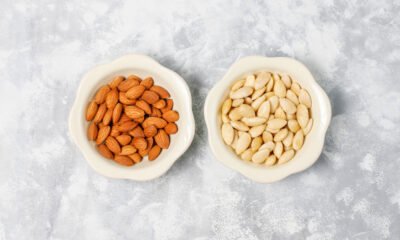Health
Coconut Water: A Refreshing Beverage with Benefits and Drawbacks
 Coconut water has become a popular health drink, but is it all it’s cracked up to be? Like most things, moderation is key. This article explores the potential benefits and drawbacks of incorporating coconut water into your daily routine.
Coconut water has become a popular health drink, but is it all it’s cracked up to be? Like most things, moderation is key. This article explores the potential benefits and drawbacks of incorporating coconut water into your daily routine.
Benefits:
- Hydration Hero: Coconut water is a natural source of electrolytes, making it a great choice for rehydrating after exercise or on hot days.
- Nutrient Powerhouse: Packed with potassium, magnesium, calcium, and vitamin C, coconut water supports various bodily functions like muscle health, bone density, and immunity.
- Low-Calorie Craving Crusher: Compared to sugary drinks, coconut water is a low-calorie option to satisfy your sweet tooth without derailing your diet.
- Digestive Do-Gooder: Some people find relief from bloating or constipation thanks to coconut water’s hydrating and electrolyte-balancing properties.
Drawbacks:
- Sugar Surprise: While lower in sugar than juices and sodas, coconut water still contains natural sugars. Excessive consumption can lead to unwanted sugar intake, especially for those with diabetes or sugar sensitivity.
- Pricey Pick-Me-Up: Depending on location, It can be expensive compared to readily available options like tap water. Daily consumption can add up over time.
- Not for Everyone: Coconut allergies, kidney issues, uncontrolled high blood pressure, and certain medications can make coconut water unsuitable for some individuals.
Who Should Avoid Coconut Water:
- Coconut Allergy Sufferers: People allergic to coconuts or their components should steer clear to avoid allergic reactions.
- Those with Kidney Problems: It’s high potassium content can worsen existing kidney issues or cause hyperkalemia in individuals with restricted potassium intake.
- Individuals with Uncontrolled High Blood Pressure: Excessive potassium can potentially aggravate hypertension, so moderation is key for those with uncontrolled high blood pressure.
- Diabetics: It’s natural sugars can impact blood sugar levels. Diabetics need to monitor their carbohydrate intake and adjust consumption accordingly.
- Those Prone to Digestive Issues: It may cause discomfort in people with sensitive stomachs or irritable bowel syndrome.
- Infants Under Six Months: Breast milk or formula is essential for a baby’s growth and development. It is not a recommended substitute.
- People on Certain Medications: Medications affecting potassium levels can interact with it. Consult your doctor before adding it to your diet if you take such medications.
- Remember: Before making significant dietary changes, consult a healthcare professional or registered dietitian, especially if you have specific health concerns or medical conditions.
-

 Money4 weeks ago
Money4 weeks agoPost Office PPF Calculator: How Much Will You Get by Investing Rs 1,000, 5,000, and 10,000 Monthly for 15 Years?
-

 Health4 weeks ago
Health4 weeks agoSoaked vs. Raw Almonds: The Healthier Choice for Weight Loss & Wellness
-

 Health3 weeks ago
Health3 weeks agoHealth Benefits of Curry Leaves: A Nutritional Powerhouse for Wellness
-

 Money2 weeks ago
Money2 weeks ago7 Key Benefits of Hiring a Financial Advisor-Even If You’re Financially Secure
-

 Money1 week ago
Money1 week agoHow Much Money Do You Need to Retire Early in India? A Comprehensive Guide
-

 Health4 weeks ago
Health4 weeks agoMorning Walk or Evening Run: Which Is Better for Heart Health?
-

 Money4 weeks ago
Money4 weeks agoDividend Yield Funds: Why Should You Invest in Them? Key Advantages Explained
-

 Cryptocurrency4 weeks ago
Cryptocurrency4 weeks agoTop AI Agent Coins to Watch in 2025: The Future of AI-Powered Cryptocurrencies


















